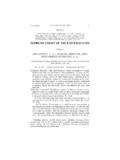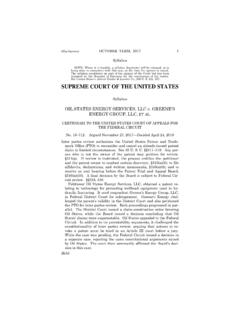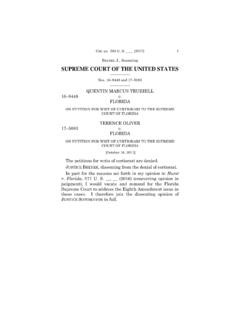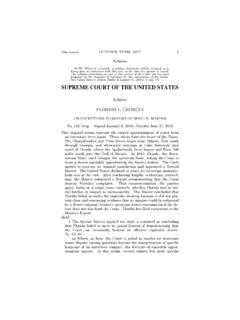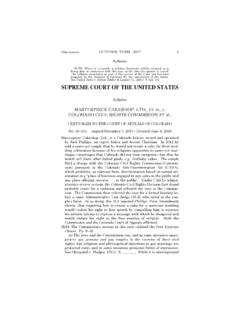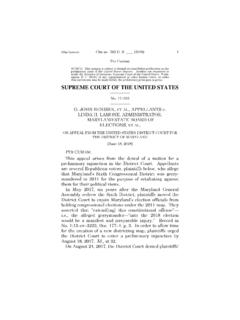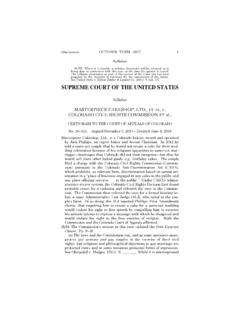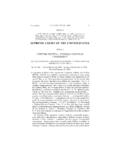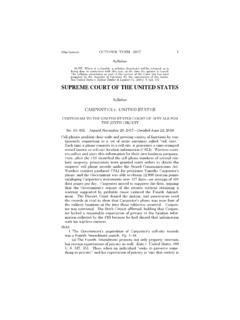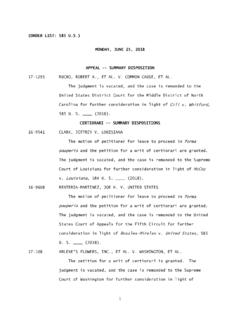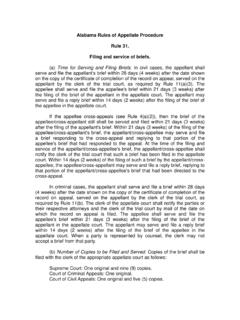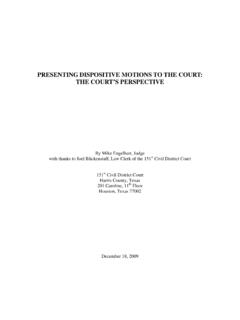Transcription of SUPREME COURT OF THE UNITED STATES
1 (Slip Opinion) OCTOBER TERM, 2021 1 Syllabus NOTE: Where it is feasible, a syllabus (headnote) will be released, as is being done in connection with this case, at the time the opinion is issued. The syllabus constitutes no part of the opinion of the COURT but has been prepared by the Reporter of Decisions for the convenience of the reader. See UNITED STATES v. Detroit Timber & Lumber Co., 200 U. S. 321, 337. SUPREME COURT OF THE UNITED STATES Syllabus WHOLE WOMAN S HEALTH ET AL. v. JACKSON, JUDGE, DISTRICT COURT OF TEXAS, 114TH DISTRICT, ET AL. CERTIORARI TO THE UNITED STATES COURT OF APPEALS FOR THE FIFTH CIRCUIT No. 21 463. Argued November 1, 2021 Decided December 10, 2021 The COURT granted certiorari before judgment in this case to determine whether the petitioners may pursue a pre-enforcement challenge to Texas Senate Bill 8 the Texas Heartbeat Act a Texas statute en-acted in 2021 that prohibits physicians from performing or inducing an abortion if the physician detected a fetal heartbeat.
2 S. B. 8 does not allow state officials to bring criminal prosecutions or civil actions to enforce the law but instead directs enforcement through private civil actions culminating in injunctions and statutory damages awards against those who perform or assist with prohibited abortions. Tex. Health & Safety Code Ann. (a), (a), (a)(2), (3). Tracking language from Planned Parenthood of Southeastern Pa. v. Casey, 505 U. S. 833, S. B. 8 permits abortion providers to defeat any suit against them by showing, among other things, that holding them liable would place an undue burden on women seeking abortions. (a) (b). The petitioners are abortion providers who sought pre-enforcement review of S.
3 B. 8 in federal COURT based on the allegation that S. B. 8 violates the Federal Constitution. The petitioners sought an injunc-tion barring the following defendants from taking any action to enforce the statute: a state- COURT judge, Austin Jackson; a state- COURT clerk, Penny Clarkston; Texas attorney general, Ken Paxton; executive di-rector of the Texas Medical Board, Stephen Carlton; executive director of the Texas Board of Nursing, Katherine Thomas; executive director of the Texas Board of Pharmacy, Allison Benz; executive commissioner of the Texas Health and Human Services Commission, Cecile Young; 2 WHOLE WOMAN S HEALTH v. JACKSON Syllabus and a single private party, Mark Lee Dickson.
4 The public-official de-fendants moved to dismiss the complaint citing, among other things, the doctrine of sovereign immunity. Mr. Dickson also moved to dis-miss, claiming that the petitioners lacked standing to sue him. The District COURT denied these motions. The public-official defendants filed an interlocutory appeal with the Fifth Circuit under the collateral order doctrine, which allows immediate appellate review of an order denying sovereign immunity. The Fifth Circuit decided to entertain a second interlocutory appeal filed by Mr. Dickson given the overlap in issues between his appeal and the appeal filed by the public-official defendants.
5 The Fifth Circuit denied the petitioners request for an injunction barring the law s enforcement pending resolution of the merits of the defendants appeals, and instead issued an order staying proceedings in the District COURT until that time. The petitioners then filed a request for injunctive relief with the COURT , seeking emergency resolution of their application ahead of S. B. 8 s approaching effective date. In the abbreviated time available for review, the COURT concluded that the petitioners filings failed to identify a basis in existing law that could justify disturbing the Fifth Circuit s decision to deny injunctive relief. Whole Woman s Health v. Jackson, 594 U.
6 S. ___, ___. The pe-titioners then filed another emergency request asking the COURT to grant certiorari before judgment to resolve the defendants appeals in the first instance, which the COURT granted. Held: The order of the District COURT is affirmed in part and reversed in part, and the case is remanded. ___F. Supp. 3d ___, affirmed in part, reversed in part, and remanded. JUSTICE GORSUCH announced the judgment of the COURT , and deliv-ered the opinion of the COURT except as to Part II C, concluding that a pre-enforcement challenge to S. B. 8 under the Federal Constitution may proceed past the motion to dismiss stage against certain of the named defendants but not others.
7 Pp. 4 11, 14 17. (a) Because the COURT granted certiorari before judgment, the COURT effectively stands in the shoes of the COURT of Appeals and reviews the defendants appeals challenging the District COURT s order denying their motions to dismiss. As with any interlocutory appeal, the COURT s review is limited to the particular order under review and any other ruling inextricably intertwined with or necessary to ensure mean-ingful review of it. Swint v. Chambers County Comm n, 514 U. S. 35, 51. In this preliminary posture, the ultimate merits question, whether S. B. 8 is consistent with the Federal Constitution, is not before the COURT .
8 P. 4. (b) The COURT concludes that the petitioners may pursue a pre-en-forcement challenge against certain of the named defendants but not others. Pp. 4 11, 14 17. Cite as: 595 U. S. ____ (2021) 3 Syllabus (1) Under the doctrine of sovereign immunity, named defendants Penny Clarkston (a state- COURT clerk) and Austin Jackson (a state- COURT judge) should be dismissed. The petitioners have explained that they hope to certify a class and request an order enjoining all state- COURT clerks from docketing S. B. 8 cases, and all state- COURT judges from hearing them. The difficulty with this theory of relief is that STATES are generally immune from suit under the terms of the Eleventh Amendment or the doctrine of sovereign immunity.
9 While the COURT in Ex parte Young, 209 U. S. 123, did recognize a narrow exception al-lowing an action to prevent state officials from enforcing state laws that are contrary to federal law, that exception is grounded in tradi-tional equity practice. Id., at 159 160. And as Ex parte Young itself explained, this traditional exception does not normally permit federal courts to issue injunctions against state- COURT judges or clerks. The traditional remedy against such actors has been some form of appeal, not an ex ante injunction preventing courts from hearing cases. As stated in Ex parte Young, an injunction against a state COURT or its machinery would be a violation of the whole scheme of our Govern-ment.
10 Id., at 163. The petitioners clerk-and- COURT theory thus fails under Ex parte Young. It fails for the additional reason that no Article III case or contro-versy between adverse litigants exists between the petitioners who challenge S. B. 8 and either the state- COURT clerks who may docket dis-putes against the petitioners or the state- COURT judges who decide those disputes. Muskrat v. UNITED STATES , 219 U. S. 346, 361; see Pulliam v. Allen 466 U. S. 522, 538, n. 18. Further, as to remedy, Article III does not confer on federal judges the power to supervise governmental op-erations. The petitioners offer no meaningful limiting principle that would apply if federal judges could enjoin state- COURT judges and clerks from entertaining disputes under S.
